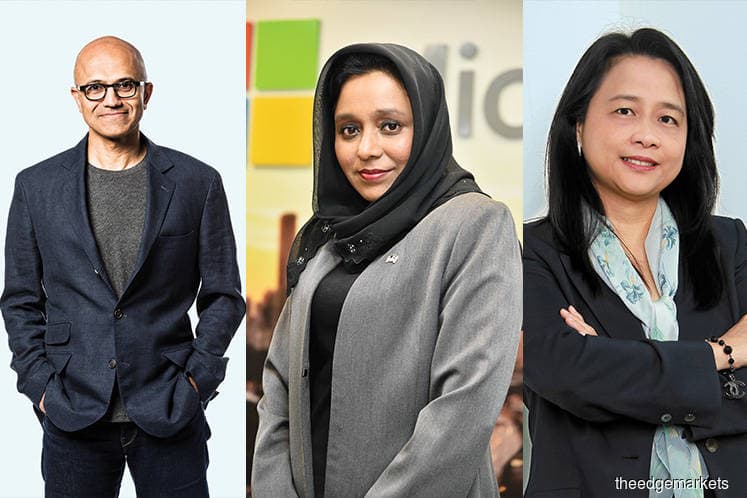
This article first appeared in The Edge Malaysia Weekly on November 13, 2017 - November 19, 2017
ADVANCEMENTS in automation and artificial intelligence could eliminate many jobs in the future, and there is a real need to prepare for it. Yet, it is equally important to remember that technology enables new ways of learning and continues to empower people and organisations to do more.
Founded on the principle that people can do remarkable things when technology is within reach, Microsoft Corp knows how the right technology can become the engine for creating, sharing, exploring, teaching and much more.
“We definitely want more productivity and efficiency, but we do not want to degrade humanity. We want technology to provide new levels of inclusiveness,” Microsoft CEO Satya Nadella was quoted as saying at a recent event in the US.
The company believes that positive economic opportunities will be generated when technology becomes increasingly accessible to more people, as organisations undergo digital transformation and governments nurture a future-ready workforce.
And as advancements in technology continue to drive profound changes in the way we live, work and play, there is greater need to focus on the aspect of “humanware”, says Microsoft Malaysia director of Legal, Corporate and Government Affairs, Dr Jasmine Begum.
This becomes even more crucial as the technology native “Generation Z” graduates and enters the workforce.
“In today’s cloud-first, artificial intelligence-first world, organisations and individuals are having to rethink everything from culture to tools and environments. Today, it is not about where you work, it is what you do,” Begum tells The Edge.
“These young adults are largely future-focused realists who are passionate about making a difference, and we have an opportunity to show them how technology in general — and science, technology, engineering and mathematics (STEM) in particular — can turn passion into results and outcomes,” says Begum.
“While automation and disruption have become fixtures in today’s vocabulary, so have innovation, creativity and empathy. There will always be technofantasists and technofatalists, but reality lies somewhere in the middle, and it is up to us, as active participants [in the fourth industrial revolution], to ensure that today’s digital economy creates and advances a future that is truly for everyone,” Begum says.
So what does the country need to know about embracing digitalisation in business?
As a young nation, Malaysia has the advantage of having fewer legacy systems and business models to manage, says IBM Malaysia managing director Chong Chye Neo.
“Digitalisation is a disruptive force that has already redefined many businesses around the world and in Malaysia. It has made the world flatter and democratised opportunities by removing barriers to entry and helped young emerging organisations take on more established entities.
“Businesses in Malaysia need to unlock the data that is within their organisation's firewall to make critical decisions and incorporate cognitive tools to create multiple channels for their clients and significantly enhance their clients' experience,” she says.
Chong urges organisations to rethink the role of people, redesign jobs around disruptive technologies and make sure their people are trained to make full use of cognitive tools and robotic systems.
IBM Malaysia, for instance, uses an in-house virtual portal “Think Academy” to create a personalised learning environment to help each IBM employee develop new skills in a scalable way.
“Case in point, each learning module can be as short as five minutes and is on average about 20 minutes. All [IBM staff] are expected to invest at least 40 hours of learning each year through Think Academy,” she says.
Chong will be speaking at the upcoming Future of Work, Workplace, Workforce Conference organised by Talent Corporation Malaysia (TalentCorp). The one-day conference will be held on Nov 20 at the Shangri-La Hotel Kuala Lumpur.
Confirmed speakers include TalentCorp CEO Shareen Shariza Abdul Ghani; Minister in the Prime Minister’s Department Datuk Seri Abdul Rahman Dahlan, education and creativity expert Sir Ken Robinson and Massachusetts Institute of Technology Initiative on the Digital Economy co-founder Andrew McAfee.
IBM Malaysia and Microsoft Malaysia are technology partners of this conference. Visit futureofwork.my for more information and updates.
The Edge is the media partner of the Future of Work, Workplace, Workforce Conference
Save by subscribing to us for your print and/or digital copy.
P/S: The Edge is also available on Apple's AppStore and Androids' Google Play.